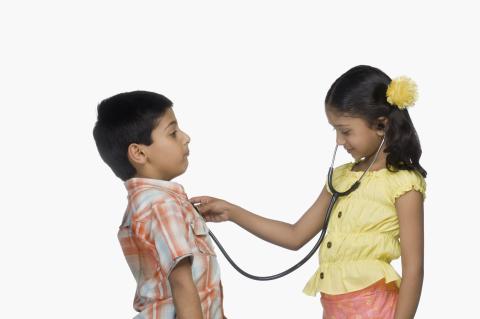Blog and News
Blog & News
Hot Topics
Siblings of Children with Special Needs
-

Having a child with special needs is difficult for parents, but it is also hard on their typically developing siblings. Proper family centered care and services should include the entire family – all children – and not just the ones affected by the condition. The typically developing siblings of children with genetic conditions grow up with unique experiences and may face additional life stresses. But, these children also develop different viewpoints and characteristics from their peers, such as:
- Increased patience;
- Dependability;
- Insight on coping with challenges;
- Acceptance and understanding of differences;
- Greater awareness of the things that really matter; and
- Confidence, especially in response to adversity.
There has been little research on the typically developing siblings of children with special needs, and the research that is available has been far from definitive. The lack of research is not surprising because just as no two people with special needs are the same, no two siblings are the same in how they deal with their situation. Although there are no conclusive recommendations to ensure the success of a typically developing child whose sibling has special needs, here are some general tips to help parents meet their needs:
Watch Your Actions Because Children Will Mimic.
The reaction of parents is a good indicator of how typically developing children will respond to their sibling. If parents view the condition as a challenge to overcome rather than dwell on, children will do the same. Ryan Macks, child psychologist at Cincinnati’s Children’s Hospital, said, “One of the things we know is that the mental health of the parent, their coping skills, tends to be the primary predictor in terms of how the sibling is going to handle the situation”.5
Allow Typical Child-Like Behaviors Among Your Children.
In most instances, siblings are the first social relationships of children and serve as the basis for their interactions with others outside the family. Because of this, petty arguments can actually better prepare your child for the real world. It can be difficult to allow your children to argue, especially if your child with special needs is particularly vulnerable, but it is important that your typically developing child does not always have to compromise. As long as the situation is not cruel or unsafe, let your children deal with their dilemmas on their own every once in a while.
Celebrate All of Your Children’s Accomplishments and Milestones.
Oftentimes, the accomplishments of children with special needs are heightened because their condition is limiting or their future is uncertain. Although it is important to celebrate these milestones, it can be difficult for your typically developing child to watch these celebrations and not have as many of their accomplishments noticed. Celebrate all of your children’s milestones equally, even if they are for different events or achievements.
Have Equal Expectations Among Children.
Make sure that all children are responsible for a similar amount of work around the house. This can help decrease resentment felt by your typically developing child and help your child with special needs feel as if they are contributing to the family.
Inclusion and Communication Is Key.
Let your typically developing child know they are welcome in meetings and appointments. It is important that your typically developing child knows that you want to hear and value their opinion about their sibling’s care.
Keeping these tips in mind is the first step towards providing a loving and supportive environment for all members of your family, including your typically developing child. With this, siblings can learn from one another, and these advantages can outweigh the worries.
Stay tuned for next week’s blog - Siblings of Children with Special Needs: Emotions
References- Boyse, Kyla. Siblings of kids with special needs. University of Michigan Health Center. www.med.umich.edu/yourchild/topics/specneed.htm. Updated July 2009.
- Coping with birth defects. India Parenting. http://www.indiaparenting.com/newborn-care/254_3606/coping-with-birth-defects.html.
- Gurian, Anita. Siblings of children with special needs. The Child Study Center: NYU Lagone Medical Center. http://www.aboutourkids.org/articles/siblings_children_special_needs.
- Hartwell-Walker, Marie. (2006). What about me? Support for the siblings of disabled children. Psych Central. http://psychcentral.com/lib/2006/what-about-me-support-for-the-siblings-of-disabled-children/.
- Mishori, Ranit. “Autism can have large effects, good and bad, on a disabled child’s siblings,” The Washington Post, 3, September, 2012.
- NPR, “Siblings with special needs change childhood”. 25, September, 2012. http://www.npr.org/2012/09/25/161754564/siblings-with-special-needs-change-childhood.
- Schwartzberg, Neala. (2006). Parenting Siblings of Children with Disabilities. Parents. www.parents.com/parenting/better-parenting/teaching-tolerance/parenting-siblings-of-children-with-disabilities/?page=2.
- Siblings and Cancer. (2012). Cancer.net. http://www.cancer.net/coping/relationships-and-cancer/siblings-and-cancer.
- Sibling Issues. (2013). National Dissemination Center for Children with Disabilities. http://nichcy.org/families-community/siblings.
- What siblings would like parents and service providers to know. Sibling Support Project. http://www.siblingsupport.org/publications/what-siblings-would-like-parents-and-service-providers-to-know.
Ask an Expert
Have a question that’s not answered on Baby’s First Test? Send it to our experts.
